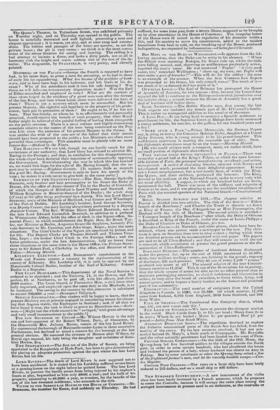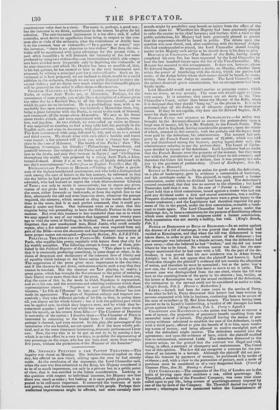NEW STRINGED INSTRUMENT.—A new instrument of the violin class has
been lately invented by a French amateur, which he proposes to name the Contralto, because it will occupy the same place among the stringed instruments at present used in an orchestra, as the contralto or countratenor voice does in a choir. The name is, perhaps, a good one ; but the inventor is, we think, unfortunate in the reason he gives for his selection. The new-invented instrument is a low alto ; and, if called contralto, must derive its appellation from being, in respect to the com- mon alto or viola of the orchestra, what the contrabass° or double base is to the common base or violoncello.—" lira quartet or sextet," says the inventor, " there is no objection to two violins." But then the con- tralto will be substitutea with great advantage for the second viola, a part often inaudible ; it will diminish the intensity of the low notes produced by using two violoncellos—an inconvenience which able compo- sers have avoided most frequently only by depriving the violoncello of its true character, and which Mr. Onslow has been so sensible of, that, in his last quintet, he has seemed to hint at the very instrument now proposed, by writing a principal part for a violoncello-alto. Such an in- strument as is here proposed, we are inclined to think,would be a useful addition to the orchestra, though we are not quite disposed to reject the second violins ; and we doubt very much whether the violoncello-players will be grateful for the relief it offers thern.—Hormonicon. ENGLISH MANNERS IN EGYPT.—" I cannot express how civil the Turks, or rather Arab Turks are, at Alexandria. Perhaps, for the amusement of some people, you might like a description of a dinner given the other day by a Kershid Bey, to all the European consuls, and to which he gave me an invitation. He is a good-looking man, with a re- markably fine open countenance ; was formerly a Mameluke slave, but, being a great favourite with the Paella, is raised to the rank of General, and commands all the troops about Alexandria. We met at his house about twelve o'clock, and were entertained with music, dancers, wrest- lers, and jugglers. At two o'clock, we were called up stairs to dinner. I was surprised on entering to find a long table laid out precisely in the English style, and wine in decanters, with glass services, saltcellars, &c. The fedst commenced with soup, followed by fish, and so on to a second and third course. We drank wine with each other ; healths and toasts went round ; a few selected will show you what a change has taken place in the sans of Mahomet. ' The health of the Pacha ;' then 6 The European Sovereigns, his friends ;' Philanthropy, benevolence, and goodwill between the subjects of the Paella and the Europeans ;" Sue. cess to the Arabs, and may they increase in Egypt ;' and 6 Civilization throughout the world,' was proposed by a young Arab Turk, a Lieu- tenant-Colonel. About 5 r. m. we broke up, all highly delighted with our day's entertainment."—Letter /rum an English Traveller, Dec. 17.
EXTRAORDINARY POWERS OF MENORY.—Visiting at Naples a gentle- man of the highest intellectual attainments, and who held a distinguished rank among the men of letters in the last century, he informed us that the day before he had passed much time in examining a man, not highly educated, who had learned to repeat the whole Gierusalemme Liberate of Tasso ; not only to recite it consecutively, but to repeat any given stanza of any given book; to repeat those stanzas in utter defiance of the sense, either forwards or backwards, or from the eighth line to the first, alternately the odd and even lines—in short, whatever the passage required, the memory, which seemed to cling to the words much more than to the sense, had it at such perfect command, that it could pro- duce it under any form. Our informant went on to state, that this singular being was proceeding to learn the Orlando Farioso in the same manner. But even this instance is less wonderful than one as to which We may appeal to any of our readers that happened some twenty years ago to visit the town of Stirling, in Scotland. No such person can have forgotten that poor uneducated man, Blind Jamie, who could actually repeat, after a few minutes' consideration, any verse required from any part of the Bible—even the obscurest and least important enumeration of mere proper names not excepted.—Quorterly Review, No. LXXXVIL POLITICAL THEATRICALS IN Cobbett has a son at Paris, who supplies him pretty regularly with letters from that city for his weekly pamphlet. The following extract is from one of them, pub- lished in the Political Register of this morning. " This place is so lively, that it is constantly producing something, in some shape or other, in de- rision of despotism and declaratory of the inherent love of liberty and of equality which belongs to the brave nation of which it is the capital. The suppression of the press gives more importance to the theatres ; and if the theatres be put down, caricatures arise in such a way that they cannot be touched. But the theatres are flow playing, in reality, a great game, which has brought the Government to the point of reducing their liberty even more than that of the press. I must first inform you, that the cause of this is, the mode in which Napoleon is represented, and even his son, and the numerous and admiring audiences which these representations attract. Napoleon' is now played in eight different theatres, Le Fils de l'llomme' in four, and Marshal Brune' has just made its appearance. The plays of Napoleon enlarge and improve suc- cessively; they take different periods of his life, so that, in seeing them all, you almost see his whole history ; but it is in the political part which can be applied now, in which they improve most, and by which they be- come most popular : and the last which has come out, puts these words
into his mouth, on his return from Elba The Chamber of Deputies is unworthy of the nation; I dissolve them :—The Chamber of Peers is interested in returning to the feudal laws : I abolish them.' This passage is cheered, and even encored. In this play, the personages of the restoration who are hateful, are not spared. It is the most wholly poli- tical, and at the same time most interesting, dramatic performance lever saw. Now, the way this is to be put an end to is, by passing a law, which is to take effect in a very few days, to prohibit the representing of any personage on the stage, who has not been dead more than twenty Jive years, without the permission of the Minister of the Interior."



























 Previous page
Previous page